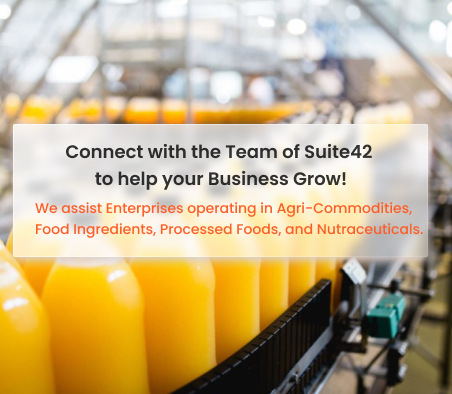
The Rise of Automation: How is Technology Transforming Food Contract Manufacturing?
Introduction
The food industry, a cornerstone of global economies, is undergoing a profound transformation. Automation, once confined to the realm of science fiction, is now a tangible reality reshaping the landscape of food production. The confluence of technological advancements and the increasing demand for efficient, safe, and sustainable food manufacturing have catalyzed the adoption of automation solutions.
The Growing Demand for Automation in the Food Industry
The imperative for automation in the food industry is driven by several compelling factors. Firstly, the burgeoning global population, coupled with rising disposable incomes, has led to a surge in demand for food products. Traditional manual methods are struggling to keep pace with this escalating demand, necessitating the adoption of more efficient and scalable production techniques.
Secondly, the food industry operates in a highly competitive environment where margins are often slim. Automation offers the potential to reduce operational costs by streamlining processes, minimizing waste, and improving overall efficiency. By automating repetitive tasks, manufacturers can free up their workforce to focus on value-added activities such as product development and quality control.
An article that might interest you: Food and Beverage Private Label Business in India
The Role of Food Contract Manufacturers in the Global Food Supply Chain
Food contract manufacturers play a pivotal role in the global food supply chain. They specialize in producing food products on behalf of other companies, offering a range of services from product development and manufacturing to packaging and distribution. As the food industry becomes increasingly complex and globalized, the demand for contract manufacturing services has grown significantly.
Automation can provide contract manufacturers with a competitive edge by enabling them to deliver high-quality products at competitive prices. By leveraging automation technologies, contract manufacturers can improve their operational efficiency, enhance product consistency, and ensure compliance with stringent food safety regulations.

The Potential of Automation to Revolutionize Food Contract Manufacturing
The potential of automation to revolutionize food contract manufacturing is immense. By automating various aspects of the production process, manufacturers can achieve significant improvements in efficiency, quality, and safety. Automation technologies can be used to optimize production lines, improve product traceability, and reduce the risk of contamination.
Moreover, automation can facilitate the integration of different systems and processes within a food manufacturing facility. This interconnectivity can enable real-time data collection and analysis, leading to better decision-making and continuous process improvement.
The Impact of Automation on the Food Industry
The adoption of automation technologies is having a profound impact on the food industry. Here are some of the key benefits:
Increased Efficiency and Productivity: Automation can significantly enhance the efficiency and productivity of food manufacturing operations. By automating repetitive tasks, manufacturers can reduce labor costs, minimize downtime, and improve overall throughput.
Improved Product Quality and Consistency: Automation technologies can help ensure consistent product quality by eliminating human error and variability. Automated systems can monitor and control production processes in real time, ensuring that products meet stringent quality standards.
Reduced Labor Costs and Waste: Automation can reduce labor costs by automating tasks that are repetitive, hazardous, or require a high degree of precision. Additionally, automation can help minimize waste by optimizing production processes and reducing product defects.
Enhanced Food Safety and Traceability: Automation can improve food safety by implementing robust quality control measures and reducing the risk of contamination. Automated systems can track and trace products throughout the supply chain, ensuring that they meet regulatory requirements and can be recalled if necessary.
Benefits of Automation in Food Contract Manufacturing
Automation offers numerous benefits for food contract manufacturers, including:
Increased Profitability: By improving efficiency, reducing costs, and enhancing product quality, automation can help increase the profitability of food contract manufacturing businesses.
Improved Competitiveness: Automation can provide contract manufacturers with a competitive advantage by enabling them to deliver high-quality products at competitive prices.
Enhanced Customer Satisfaction: Automation can help improve customer satisfaction by ensuring product quality, consistency, and timely delivery.
Greater Sustainability: Automation can contribute to greater sustainability by reducing waste, conserving energy, and minimizing environmental impact.
Challenges of Automation in Food Contract Manufacturing
While automation offers significant benefits, it also presents certain challenges:
High Upfront Costs: The initial investment in automation equipment and software can be substantial. However, the long-term benefits of automation, such as increased efficiency and reduced costs, can justify the upfront investment.
Resistance to Change: Introducing automation into a manufacturing facility can encounter resistance from employees who may fear job loss or changes to their work routines. It is essential to address these concerns and provide adequate training and support to facilitate the transition to automation.
Skill Gaps in the Workforce: The effective implementation and operation of automation technologies require a skilled workforce with expertise in areas such as robotics, data analytics, and automation engineering. Addressing skill gaps may necessitate training programs or recruitment of specialized personnel.
Data Privacy and Security Concerns: Automation involves the collection and processing of large amounts of data, raising concerns about data privacy and security. It is essential to implement robust data protection measures to safeguard sensitive information.

Best Practices for Food Contract Manufacturing Automation
To maximize the benefits of automation in food contract manufacturing, it is essential to follow the best practices:
Identifying the Right Automation Solutions: Carefully assess your specific needs and requirements to identify the most suitable automation technologies for your manufacturing processes. Consider factors such as production volume, product complexity, and desired outcomes.
Developing a Comprehensive Automation Strategy: Create a well-defined automation strategy that outlines your objectives, timelines, and budget. Consider the potential impacts of automation on your workforce, operations, and overall business strategy.
Investing in Employee Training and Development: Provide adequate training and support to your employees to ensure they have the skills and knowledge necessary to operate and maintain automation equipment. This will help mitigate resistance to change and maximize the benefits of automation.
Ensuring Data Security and Compliance: Implement robust data security measures to protect sensitive information and ensure compliance with relevant regulations. Regularly review and update your security protocols to address emerging threats.
An article that might interest you: 5 Powerful Cost-Saving Tactics for Lean Food Production
Cost of Food Contract Manufacturing Automation
The cost of food contract manufacturing automation can vary significantly depending on several factors:
Factors Affecting the Cost of Automation: The cost of automation solutions can be influenced by factors such as the scale of the project, the complexity of the manufacturing processes, the specific technologies involved, and the level of customization required.
Return on Investment (ROI) of Automation: While the upfront costs of automation can be substantial, the long-term benefits, such as increased efficiency, reduced costs, and improved product quality, can lead to a significant return on investment.
Cost-Effective Automation Solutions: There are various cost-effective automation solutions available, including modular systems, used equipment, and leasing options. Exploring these alternatives can help optimize your investment and minimize upfront costs.
How Can Automation Improve Food Safety in Contract Manufacturing?
Automation can play a crucial role in enhancing food safety in contract manufacturing:
Real-time Monitoring and Control: Automated systems can monitor and control production processes in real time, ensuring compliance with food safety standards and identifying potential hazards.
Traceability and Transparency: Automation can improve traceability by tracking products throughout the supply chain, making it easier to identify the source of any contamination or quality issues.
Preventative Maintenance: Automated systems can schedule and perform preventative maintenance on equipment, reducing the risk of breakdowns and minimizing the potential for contamination.
Compliance with Food Safety Regulations: Automation can help ensure compliance with food safety regulations by automating tasks such as record-keeping, documentation, and quality control.
How Suite42 Can Help You
Suite42 is a leading provider of automation solutions for brands looking for food contract manufacturing. Our team of experts can help you:
Suite42’s Expertise in Food Contract Manufacturing Automation: Our manufacturing partners have extensive experience in implementing automation solutions specifically tailored to the needs of the food industry.
Tailored Automation Solutions for Your Specific Needs: We can work with you to develop customized automation solutions that address your unique challenges and objectives.
Proven Track Record of Successful Implementations: Suite42 has a proven track record of successfully implementing automation projects in the food contract manufacturing sector.
Commitment to Continuous Innovation and Improvement: We are committed to staying at the forefront of automation technology and providing our clients with the latest innovations.

The Benefits Realized by Suite42’s Clients Through Automation
Suite42’s clients have experienced numerous benefits from our automation solutions, including:
Increased Profitability: Automation has helped our clients improve their profitability by increasing efficiency, reducing costs, and enhancing product quality.
Improved Competitiveness: Automation has provided our clients with a competitive advantage by enabling them to deliver high-quality products at competitive prices.
Enhanced Customer Satisfaction: Automation has helped our clients improve customer satisfaction by ensuring product quality, consistency, and timely delivery.
Greater Sustainability: Automation has contributed to greater sustainability for our clients by reducing waste, conserving energy, and minimizing environmental impact.
What are the Top Automation Technologies for Food Contract Manufacturing in India?
Several automation technologies are being widely adopted in the Indian food contract manufacturing industry:
Robotics and Automation Systems: Robotic arms and automated machines can perform various tasks, such as packaging, palletizing, and material handling.
Artificial Intelligence (AI) and Machine Learning: AI and machine learning can be used to optimize production processes, predict equipment failures, and improve quality control.
Internet of Things (IoT) and Sensors: IoT sensors can collect data on production processes, equipment performance, and product quality, enabling real-time monitoring and control.
Cloud Computing and Data Analytics: Cloud computing platforms can provide scalable computing resources for data analysis and automation applications. Data analytics can help identify trends, optimize operations, and improve decision-making.
Conclusion
The rise of automation is transforming the food contract manufacturing industry in India. By embracing automation technologies, manufacturers can enhance efficiency, improve product quality, reduce costs, and ensure food safety. Suite42 is committed to helping food contract manufacturers harness the






Leave a Reply